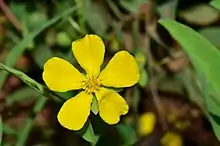| Hibbertia nymphaea | |
|---|---|
 | |
| Scientific classification | |
| Kingdom: | Plantae |
| Clade: | Tracheophytes |
| Clade: | Angiosperms |
| Clade: | Eudicots |
| Order: | Dilleniales |
| Family: | Dilleniaceae |
| Genus: | Hibbertia |
| Species: | H. nymphaea |
| Binomial name | |
| Hibbertia nymphaea | |
Hibbertia nymphaea is a species of flowering plant in the family Dilleniaceae and is endemic to the south-west of Western Australia. It is a prostrate or straggling shrub that typically grows to a height of 40 cm (16 in) and flowers between August and October producing yellow flowers.[2] It was first formally described in 1904 by Ludwig Diels in Botanische Jahrbücher für Systematik, Pflanzengeschichte und Pflanzengeographie.[3] The specific epithet (nymphaea) is a reference to nymphs who live in fountains and rivers.[4]
Hibbertia nymphaea grows in seasonally wet places and near rivers in the Jarrah Forest, Swan Coastal Plain and Warren biogeographic regions of south-western Western Australia.[2]
See also
References
- ↑ "Hibbertia nymphaea". Australian Plant Census. Retrieved 29 July 2021.
- 1 2 "Hibbertia nymphaea". FloraBase. Western Australian Government Department of Biodiversity, Conservation and Attractions.
- ↑ "Hibbertia nymphaea". APNI. Retrieved 29 July 2021.
- ↑ Sharr, Francis Aubi; George, Alex (2019). Western Australian Plant Names and Their Meanings (3rd ed.). Kardinya, WA: Four Gables Press. p. 262. ISBN 9780958034180.
This article is issued from Wikipedia. The text is licensed under Creative Commons - Attribution - Sharealike. Additional terms may apply for the media files.